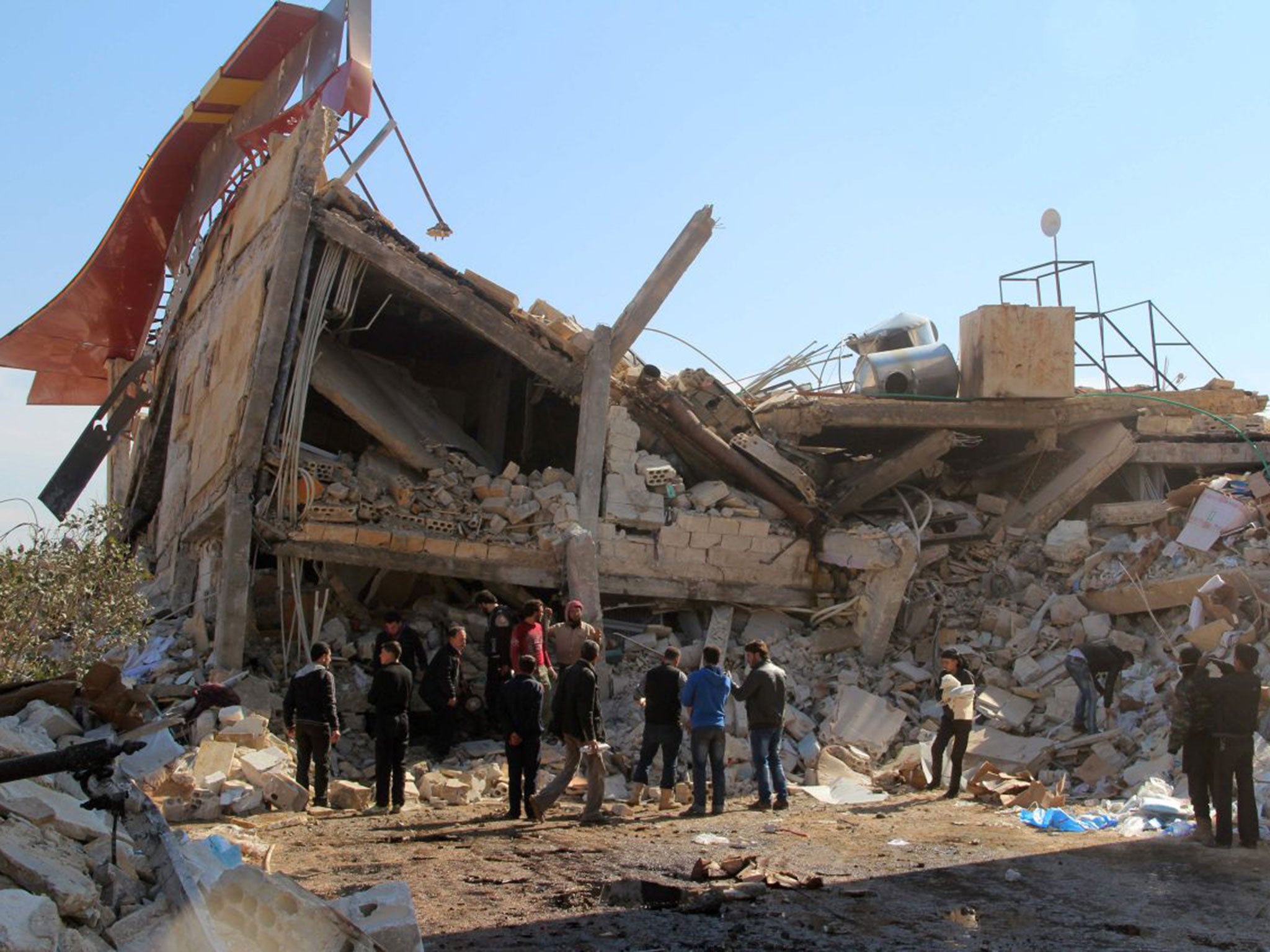Russian air strikes in Syria: 'Nothing UK can do' to punish Russia for 'war crimes', Conservative MP Andrew Mitchell says
Andrew Mitchell said Angela Merkel's suggestion of a no-fly zone would be impossible to implement

A Conservative MP has admitted there is “nothing the UK” can do to stop Russia’s alleged bombing of hospitals and civilian areas in Syria.
Andrew Mitchell, the former International Development Secretary, said Monday’s air strikes on hospitals and a school were “certainly a war crime”.
Almost 50 civilians were killed when missiles hit at severak medical facilities and schools in rebel-held areas of Syria, according to the United Nations, which called the attacks a blatant violation of international law.
At least 14 were killed in the northern town of Azaz, the last rebel stronghold before the border with Turkey, where missiles hit a children's hospital and a school sheltering refugees, while 15 were feared dead at a Doctors Without Borders (MSF) hospital in Ma’arat Al Numan, Idlib province.
The humanitarian organisation said the building was hit by four missiles in what appeared to be a “deliberate attack” on health facilities.
Russia has not directly admitted responsibility but claimed its air force had targeted Isis infrastructure.
“It's certainly a war crime,” Mr Mitchell told the BBC Radio 4's Today programme.
“The Russian Air Force has now hit 30 hospitals in Syria of which only one is in an Isil (Isis) area.
"Everyone knew this was a Medecins Sans Frontieres (Doctors Without Borders) hospital and undoubtedly this is a breach of the international law and the Russians are guilty of that."
Turkey and France have also agreed that the attacks constitute war crimes but a way of reprimanding Russia or stopping the bloodshed seems unclear.
”There is effectively nothing we can do at the moment but they can be held to account in the future,“ Mr Mitchell said, condemning the “international anarchy”.
“There are many other countries in the United Nations, which will be horrified and appalled by these Russian actions against innocent civilians and for Russia's reputation in the future and its role in the UN this has a very significant effect.”
He did not support Angela Merkel’s suggestion of a “no-fly zone” to prevent air strikes by all warring parties.
“The problem with no-fly zones is frankly that no one is going to enforce it,” he said.
“It is clearly taking part in the contest because it’s about the Russian and Syrian air force…it would be an intervention in the battle.
“(A no-fly zone) is pie in the sky, it’s not going to happen, and we need to recognise that.
Mr Mitchell instead argued for the creation of a “safe haven” in Syria, where an enclave would be created for civilians protected by international troops and safe from aerial attacks.
But William Hague, the former Foreign Secretary, previously argued against the measure, calling it “impractical at best and dangerous at worst”.
The German Chancellor said a no-fly zone would have to be negotiated, rather than enforced as Libya’s was in 2011, as to do so would mean bombing Russian and Syrian bases.
Vladimir Putin’s official spokesperson denied war crimes today, dismissing them as “unfounded accusations”.
“We categorically do not accept such statements, the more so as every time those making these statements are unable to prove their unfounded accusations in any way,” Dmitry Peskov said.
A temporary “cessation in hostilities” in Syria was agreed in Munich on Friday to allow the delivery of humanitarian aid to millions of civilians living in areas besieged by fighting.
But Bashar al-Assad cast doubt on the ceasefire’s success by taking to Syrian television to say battles would not stop and that “terrorists” – meaning all rebels under the regime’s definition – would not be allowed to operate in any way.
In pictures: Russian air strikes in Syria
Show all 19Russia is one of the only countries to openly support the Syrian President, who the West wants to see permanently removed to usher in a new government and end the bitter civil war.
Chris Hill, an American diplomat and former US ambassador in the Middle East, argued that Assad must be included in discussions.
“Assad represents a faction that need to be participants in peace process if it’s going to go everywhere,” he told Today.
“There needs to be a lot more work on a consensus on what Syria’s going to look like in the future.”
Mr Hill, who helped negotiate the Bosnia peace settlement in 1995, was sceptical on the success of the ceasefire, saying that a truce must be the last and “natural step” when there is already a clear understanding of future political arrangements.
He added: “From my experience this has not gone in the proper sequence.”
Subscribe to Independent Premium to bookmark this article
Want to bookmark your favourite articles and stories to read or reference later? Start your Independent Premium subscription today.

Join our commenting forum
Join thought-provoking conversations, follow other Independent readers and see their replies